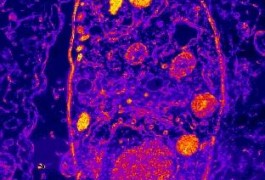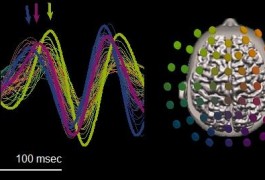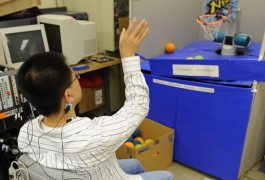Ethnic labels
With World Autism Awareness Day just behind us, it seems fitting to me to ask: Is autism more common among children of some ethnicities than in others?
With World Autism Awareness Day just behind us, it seems fitting to me to ask: Is autism more common among children of some ethnicities than in others?

Do most cases of autism result from extremely rare and spontaneous genetic mutations or from more common variations? That question has engendered the liveliest debate so far at the SFARI annual meeting.

I’m here at SFARI’s first annual meeting in New Orleans, and last night in her keynote address, genetics giant Mary Claire King predicted that as scientists study autism and schizophrenia, they are likely to find thousands — yes, thousands — of big or small unique gene mutations in hundreds of genes involved in dozens of pathways.

Most young animals, from newly hatched chicks to 2-day-old humans, are exquisitely sensitive to the movements of other animals. But 2-year-old children with autism don’t pay special attention to this so-called ‘biological motion’, according to a study published today in Nature.

The National Institutes of Health (NIH) yesterday committed $60 million from the stimulus package to fund research goals for autism laid out in the first federal ‘strategic plan’ for autism research. That plan, published 5 March, and crafted by a federal advisory panel over the past year, recommends 40 research studies with a projected cost of $800 million over the next decade.

The literature on autism is chock full of studies of the condition in children. But studies on what autism looks like in adulthood are far fewer. Last week, one of these rare reports found that the quality of life for adults with autism is determined more by their ability to independently navigate and adapt to the minutiae of daily life — from budgeting for weekly expenses to changing a light bulb — than by their cognitive or language ability.

Over the past few decades, scientists investigating what causes schizophrenia have come up with a slew of environmental risk factors, from a mother’s socioeconomic status, to a father’s old age, and the season in which the baby is conceived.

A new way of analyzing the data gathered from electroencephalography (EEG) ― a non-invasive technique that measures brain waves through the scalp ― provides much more information about how brain regions coordinate with one another than standard EEG analysis.

The sponsors of the largest clinical trial of a treatment for autism on 18 February revealed disheartening results: fluoxetine ― commonly marketed as the antidepressant Prozac ― is no more effective than placebo at reducing repetitive behaviors in children with autism.

Mechanical engineers are developing technology that allows a robot to monitor the emotional state of a human with which it interacts.